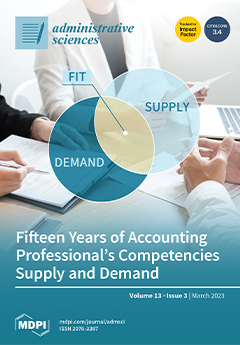Social entrepreneurship plays an important role in the maintenance of economic prosperity and brings benefits to society. The role of social entrepreneurship is growing in the light of challenges of the global economy, increasing uncertainty of the environment, the growth of social problems,
[...] Read more.
Social entrepreneurship plays an important role in the maintenance of economic prosperity and brings benefits to society. The role of social entrepreneurship is growing in the light of challenges of the global economy, increasing uncertainty of the environment, the growth of social problems, and the emergence of crises in the 2020s. These derive an increase in economic and psychological challenges. Social entrepreneurship is known as the driver for solving global problems of society. The entrepreneurial ecosystem serves as a source of entrepreneurial opportunity, as a breeding ground for entrepreneurship. Therefore, exploring the topic of social entrepreneurship in the context of the entrepreneurial ecosystem becomes relevant. Social entrepreneurship, with respect to the entrepreneurial ecosystem, has been extensively explored. However, despite a growing body of publications, to the best of our knowledge, no bibliometric analysis is available on the topic. This analysis is important to understand what trends in the development of social entrepreneurship and the ecosystem exist, what further research directions can be recommended, and how the relationship between social entrepreneurship and the entrepreneurial ecosystem has been studied. This study aims to close the gap, consolidate research, and identify the state of the art in the field. In total, 357 publications from the Scopus database were selected for the period of 2009–2022. The study used social network analysis (bibliographic coupling network, co-citation network, citation network, and co-authorship network) and semantic analysis (semantic network) through VOSviewer version 1.6.19 and Gephi version 0.10.1 software. The results showed a growth of publications during this period, allowing us to observe influential journals, the most productive and cited authors, leading countries and universities, impactful papers, networks of collaborations, and co-citations of scholars. The paper with the highest degree of centrality is “Ecosystems in Support of Social Entrepreneurs: A Literature Review” while
Sustainability is the most influential journal in the field. The analysis identified six thematic clusters within the research topic. The study contributes to the literature by presenting the research agenda, structure, characteristics of social entrepreneurship, and entrepreneurial ecosystem research.
Full article





